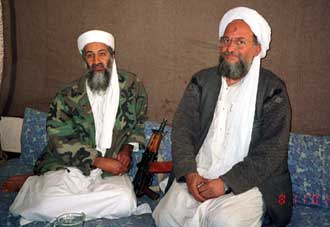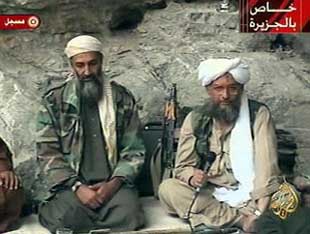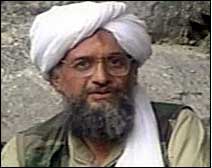|
Pakistanis may be near bin Laden's aide
(Agencies)
Updated: 2004-03-19 14:15
The Pakistani military is continuing to assault on Friday al Qaida troops believed to be protecting a "high-value" leader near the Afghanistan border, Pakistani sources said. Intelligence indicated the surrounded figure is Ayman al-Zawahiri, al Qaida's No. 2 leader, Ayman al-Zawahri.
The continuing assault against the more than 200 al Qaeda fighters consists of helicopter gunships and fixed-wing aircraft, the sources said.

Osama bin Laden (L) sits with Al Qaeda's top strategist and second-in-command Ayman al-Zawahri in this 2001 file photo. [Reuters] |
Pakistan President Gen. Pervez Musharraf said a "high value" target was believed trapped in South Waziristan, a semi-autonamous tribal belt that has resisted outside intervention for centuries.
Hundreds of troops and paramilitary rangers pounded several fortress-like mud-brick compounds with artillery and fired on them from helicopter gunships, as entrenched suspects fought back hard.
An intelligence official said "dozens" were killed Thursday. At least 41 people - 15 soldiers and 26 suspected militants - were killed earlier this week in fighting in the area.
The officials said that intelligence indicated the forces had surrounded the Egyptian-born al-Zawahri in an operation that began Tuesday, the first major break in the world's most intense manhunt in more than a year.
The region has long been considered the most likely hiding place for the top two al-Qaeda leaders - but there was no indication bin Laden was with al-Zawahri. However, the two have traveled together in the past, and bin Laden and al-Zawahri appeared jointly in video tapes released shortly after the Sept. 11, 2001, attacks on the United States.
The United States has offered a $25 million reward for information leading to al-Zawahri's capture. On Thursday, the U.S. House of Representatives doubled the reward for bin Laden's capture to $50 million.
"We have been receiving intelligence and information from our agents who are working in the tribal areas that al-Zawahri could be among the people hiding there," a Pakistani military official said. "All of our efforts are to capture him."
An intelligence official and a senior politician in Musharraf's government both confirmed the account. All spoke on condition of anonymity.
The intelligence official said information was also coming from some of the 18 suspects captured during Thursday's operation. Some said during interrogation that al-Zawahri was wounded in the raid, the official said.
Fighting spread Friday to two more villages in South Waziristan. Townspeople said heavy guns fired through the night and say they saw jet fighters in the area, although it wasn't clear if they had opened fire.
 |
| Osama bin Laden, left, with his top lieutenant Egyptian Ayman al-Zawahri, are seen at an undisclosed location in this television image broadcast Oct. 7, 2001. Graphic at top right reads 'Exclusive to Al-Jazeera.' At bottom right is the station's logo which reads 'Al-Jazeera.' At top left is 'recorded.' [AP] |
In Wana, the main town in South Waziristan, residents said they heard artillery fire through the night. Army spokesman Maj. Gen. Shaukat Sultan said early Friday that the hunt for terror suspects was "still on."
Musharraf told CNN that he'd spoken with the commander of Pakistani troops in the region. He said the commander reported "fierce resistance" from a group of fighters entrenched in fortress-like buildings.
"They are very strong there. They are dug in," he said. "It's a pitched battle."
The president added that there were indications a senior figure was surrounded, but he didn't provide a name.
"He's reasonably sure there's a high-value target there," Musharraf said. "They are not coming out in spite of the fact that we pounded them with artillery."
Information Minister Sheikh Rashid Ahmed said Friday the siege was "narrowing down," and it would only be possible to identify that target when troops get closer. "They (the militants) are giving a tough contest. They have built bunkers in their homes," he told AP.
On Thursday Secretary of State Colin Powell announced in the capital, Islamabad, that Washington was bestowing the status of "major non-NATO ally" on Pakistan, and praised the country for its help in the war on terror.
National security adviser Condoleezza Rice told CNN she could not confirm the reports.
Rice and other top U.S. officials stressed that even if al-Zawahri were captured, it wouldn't end the terror.
"It would be of course a major step forward in the war on terrorism," Rice said. "But I think we have to be careful not to assume that getting one al-Qaeda leader is going to break up the organization."
Deputy Defense Secretary Paul Wolfowitz, speaking on PBS' News Hour With Jim Lehrer, said that "anyone who thinks that that's (the capture) going to be the ... end of these terrorists networks, doesn't understand how they work." He called them decentralized groups that must be hunted down "one by one."
Gen. Richard Myers, chairman of the Joint Chiefs of Staff, told CNN that terror attack were likely to continue after any capture. "It won't end the terror."

Ayman al-Zawahiri |
The 52-year-old former Egyptian surgeon is believed to be the brains behind the terror network, with bin Laden serving more as spiritual leader and financial backer.
Often seen by bin Laden's side in videos released to Arab television networks, the doctor was also thought to serve as al-Qaeda leader's personal physician.
Al-Zawahri's Egyptian Islamic Jihad was believed behind the assassination of President Anwar Sadat during a Cairo military parade in 1981. He merged the organization with al-Qaeda in 1998.
Al-Zawahri has continued to spread his message since the Sept. 11 attacks in audiotapes, the latest broadcast on Feb. 24, in which he taunted President Bush and threatened more attacks on the United States. Another tape criticized France's decision to ban Islamic headscarves in schools.
Under pressure from Washington, Pakistan has arrested more than 500 al-Qaeda suspects and has turned most over to the United States. The last major capture was that of Khalid Shaikh Mohammed, the former al-Qaeda No. 3, who was nabbed on March 1, 2003, in a house near the capital and quickly delivered to U.S. custody. He is being held at an undisclosed location.
The Pakistani military has been pursuing 100 tribal leaders whom authorities want to roll into their efforts to hunt al-Qaeda in the Waziristan frontier. So far, about two-thirds have said they would provide information and turn over any Islamic militants in their territories, American defense officials said.
The others face destruction of their homes by the Pakistani military, officials said.
There have been several anti-terror sweeps in the tribal regions in recent months, but none so bloody as the operation that began Tuesday. Pakistani troops have moved 70,000 troops into the border region, and Musharraf on Monday promised to rid the tribal areas of foreign terrorists.
U.S. officials say they are watching to see if the Pakistani actions send militants back into Afghanistan, where U.S. troops operate freely. The U.S. military on Sunday announced the start of a new operation to track down senior al-Qaeda and Taliban fugitives.
Two American soldiers were killed and two others were wounded in fighting Thursday in central Afghanistan, the U.S. military said. At least five attackers were killed in the battle.
The military said that because of the location, the fighting did not appear to be directly related to the siege against al-Zawahri.
Afghan officials told AP they were closely monitoring the Pakistani operation.
"We are hopeful operations being carried out in border regions will yield some desirable results," said Afghan Foreign Ministry spokesman Omar Samad. "If a well known figure is part of these captures ... the world will be a safer place."
Thursday's raid concentrated on three South Waziristan towns - Azam Warsak, Shin Warsak and Kaloosha. Early morning calls from mosques warned residents to leave the area, apparently to give the troops more room to operate.
Powell, who left the country hours before the news broke, also said he believed there was evidence that bin Laden is hiding in the rugged border area.
"No one has seen him, so how can one be sure?" Powell told Geo TV. "But he has certainly given evidence that he is alive and active. But we can't be sure.
"And if he is alive and active, and the evidence suggests that he is, and if he is in the area of the Pakistan-Afghan border, that's a very difficult area to find someone who doesn't want to be found."
But an official of Afghanistan's ousted Taliban regime said Friday he doubted the deputy leader of their al Qaeda allies was among militants cornered by Pakistani troops in a border battle.
"According to my information Dr Ayman al-Zawahri is not in that area," said former Taliban defense minister, Mullah Obaidullah Akhund.
Pakistani forces have faced ferocious resistance from suspected al Qaeda militants and Pakistani tribesmen in the South Waziristan area since launching a sweep Tuesday, leading to speculation they may be protecting al-Zawahri, Osama bin Laden's right-hand man.
"It would be a speculation to say where senior al Qaeda leaders have taken shelter because they keep on changing their hideouts," Akhund told Reuters by telephone from an undisclosed location.
"Even if he is there it would be very difficult to get him alive. He has support among Muslims everywhere. The people will help him get of the area," he said.
"But if he is unable to escape, he would prefer to become a martyr," he said.
The Taliban were ousted in a U.S.-led offensive in late 2001 in the wake of the September 11 attacks on the United States, blamed on bin Laden, who was for years given sanctuary by the Taliban.
|